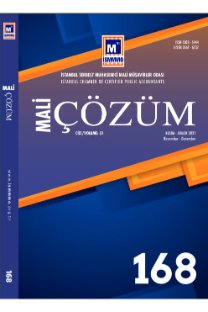MUHASEBE VE FİNANSMANDA DİJİTAL GELECEK
Teknolojik gelişmeler neticesinde ortaya çıkan yeni ihtiyaçlar ve bu ihtiyaçların giderilmesi için yaratılan çözümler hızlıca dijitalleşme çağına giriş yapmamıza sebebiyet vermiştir. Özellikle internetin yaygınlaşmaya başlaması ile, bilginin dolaşımının hızlanması, elektronik araçlar sayesinde sayılara dönüşen verilerin, bilgisayar teknolojileri sayesinde kolaylıkla transfer edilebilir hale gelmesi yeni bir çağın kapılarını aralamıştır. Bu gelişmeler karşısında, muhasebe ve finans sektöründe de devrim niteliğinde dönüşümler yaşanmaktadır. Bu çalışmada, nitel bir yöntem kullanılmış olup, dijitalleşme ve endüstri 4.0’ın finans alanında sebebiyet verdiği gelişmeler ortaya konmuş ve tartışılmıştır. Makalede, teknolojik gelişmelerin özellikle de blokzincir kanadındaki gelişmelerin, dijital varlıkların yönetilmesi, transferi ve dönüştürülmesi noktasında muhasebe ve finans sektöründeki etkileri ele alınmıştır. Bu çalışma, dijitalleşme ve endüstri 4.0 arasındaki ilişkiye ve bu ilişkinin muhasebe ve finans sektörünün geleceğine olan etkisi bakımından literatüre katkıda bulunmaktadır.
DIGITAL FUTURE IN ACCOUNTING AND FINANCE
The new requirements occurred as a result of technological developments and the solutions created to meet these needs caused us to enter to the age of digitalization very quickly. The data which turns into numbers thanks to electronic tools can be easily transferred through computer technologies. The information circulation has accelerated especially with the spread of the internet and opened the doors of new era. With these developments, revolutionary transformations took a place in the accounting and finance sector. This paper used a qualitative method, presented and discussed the developments in finance thanks to digitalization and Industry 4.0. In this paper, the effects of technological developments (especially in the blockchain), manage/transfer and transformation of digital assets in the accounting and finance sector are discussed. The present study contributes the future of accounting and finance literature by drawing attention to its relationship between digitalization and industry 4.0.
___
- Adiloğlu, B. ve Yücel, G., (2018). Dijitalleşme-Yapay Zeka Ve Muhasebe Beklentiler, Muhasebe Bilim Dünyası Dergisi, s.47-60.
- Atabey A., (2018). Ortaçağ Avrupa’sında İktisadi ve Siyasi Tarih Çerçevesinde Muhasebe İhtiyacı ve Çift Taraflı Kayıt Tekniği, Muhasebe ve Finans Araştırmaları Dergisi, s.7-38.
- Avcı, B. (2020). Dijitalleşmenin Muhasebe Mesleğine Getirdiği Yenilikler ve Uygulamalar, (Yayımlanmamış Yüksek Lisans Tezi) İstanbul Bilgi Üniversitesi, İstanbul
- Cipolla, C. M.(1985). Guns, Sails and Empires: Technological İnnovation and The Early Phases of European Expansion, 1400-1700. Thomas Y. Crowell, Sunflower University Press.
- Coron, J.S., (2005). “Merkle-Damgård Revisited: How to Construct a Hash Function”, Advances in Cryptology- CRYPTO 2005: 25th Annual International Cryptology Conference, Santa Barbara, California, ABD, s.14-18, https://iacr.org/archive/crypto2005/36210424/36210424.pdf Erişim Tarihi: 15.04.2021.
- Eldem, M. O. (2017). Endüstri 4.0. TMMOB EMO Ankara Şubesi Haber Bülteni, s.10–16.
- Gökgöz, A. (2010). Tarihsel Perspektifte Muhasebenin Doğuşunu ve Gelişimini Etkileyen Faktörler. Yalova Siyasal Bilimler Dergisi, 1, s. 167-168, https://dergipark.org.tr/tr/download/article-file/800150 Erişim Tarihi: 24.06.2021.
- Kagermann, H., Helbig, J., Hellinger, A. and Wahlster, W. (2013). Recommendations for Implementing the Strategic Initiative Indutrie 4.0: Securing the future of German Manufacturing Industry; Final report of the Industrie 4.0 Working Group.
- Karaçay, G. ve Aydın, B. (2018). The Internet of Things and New Value Proposition, E. Industry 4.0: Managing the Digital Transformation (S. 173- 185), Switzerland : Springer International Publishing.
- Keseyak, B. Endüstri Tarihine Kısa Bir Yolculuk, https://www.endustri40. com/endustri-tarihine-kisa-bir-yolculuk/ Erişim Tarihi: 15.04.2021.
- Mokyr, J. (1999). The Second Industrial Revolution, 1870-1914, (Ed.) Valerio Castronovo: Storia Dell’economia Mondiale, Laterza Publishing, Rome, s.219-245.
- Özden E. A., (2018). Endüstri 4.0 ve Uluslararası Finansal Raporlama Standartlarına Etkisi”, Endüstri 4.0 ve Örgütsel Değişim. Süleyman Demirel Üniversitesi İktisadi ve İdari Bilimler Fakültesi Dergisi, 23 (Özel Sayı), , s.1639-1650.
- Rüßmann, M., Lorenz, M., Gerbert, P., Waldner, M., Justus, J., Engel, P. and Harnisch, M., (2015) Industry 4.0: The future of productivity and growth in manufacturing industries, Boston Consulting Group, 9(1), , s.54–90.
- Soylu, A. (2018). Endüstri 4.0 ve Girişimcilikte Yeni Yaklaşımlar. Pamukkale Üniversitesi Sosyal Bilimler Enstitüsü Dergisi, 32, s. 43-57.
- Sundmaeker, H., Guillemin, P., Friess, P. and Woelfflé, S. (2010). Vision and Challenges for Realizing the Internet of Things. Cluster of European Research Projects on the Internet of Things, European Commision, 3(3), s.34-36.
- Swan, M. (2015). Blockchain: Blueprint for a New Economy, O’Reilly Media, Inc. USA.
- Tanyıldızı,H. (2020) Blokzincir (Blockchain) Teknolojileri ve Muhasebenin Geleceği, Endüstri 4.0’ın Muhasebe, Denetim ve Finans Dünyasına Yansımaları, (s. 41-63) Ankara : Gazi Kitabevi
- Thames, L., Schaefer, D., (2016). Software-Defined Cloud Manufacturing for Industry4.0. Procedia Cirp, , s. 12-17.
- Vaughan, G. (2020). Efficient Big Data Model Selection With Applications to Fraud Detection. International Journal of Forecasting 36, s.1116–1127.
- Wang, S., Wan, J., Zhang, D., Li, D., Zhang, C. (2016). Towards Smart Factory for Industry 4.0: a Self Organized Multi-Agent System with Big Data Based Feedback and Coordination. Computer Networks,.
- Witkowski, K. (2017). Internet of Things, Big Data, Industry 4.0– Innovative Solutions in Logistics and Supply Chains Management, Procedia Engineering, , s. 763-780.
- ISSN: 1303-5444
- Yayın Aralığı: Yılda 6 Sayı
- Başlangıç: 1991
- Yayıncı: İstanbul Serbest Muhasebeci Mali Müşavirler Odası
Sayıdaki Diğer Makaleler
BEDELSİZ İHRACATIN TÜRK VERGİ MEVZUATI AÇISINDAN DEĞERLENDİRİLMESİ VE MUHASEBELEŞTİRİLMESİ
TEKNOLOJİ GELİŞTİRME BÖLGELERİNDE FAALİYET GÖSTEREN ŞİRKETLERİN E-TİCARET YAZILIMI KİRALAMASI
TOPSIS YÖNTEMİYLE VERGİ DENETİM PERFORMANS DEĞERLENDİRMESİ: 2005-2019 DÖNEMİ
AVRUPA BİRLİĞİ VE TÜRKİYE’DE ÇEVRE VERGİLERİ VE BU VERGİLERDEN ELDE EDİLEN GELİRLERİN ANALİZİ
Tarık Zeki YILMAZ, Levent Yahya ESER
GERÇEĞE UYGUN DEĞER MUHASEBESİNİN KAZANÇ KALICILIĞINA ETKİSİ
Metehan KÜÇÜKER, Şuayyip Doğuş DEMİRCİ
MUHASEBE ARAŞTIRMALARINDA GÖZ İZLEME YÖNTEMİNİN KULLANILMASI ÜZERİNE KAVRAMSAL BİR ÇALIŞMA
